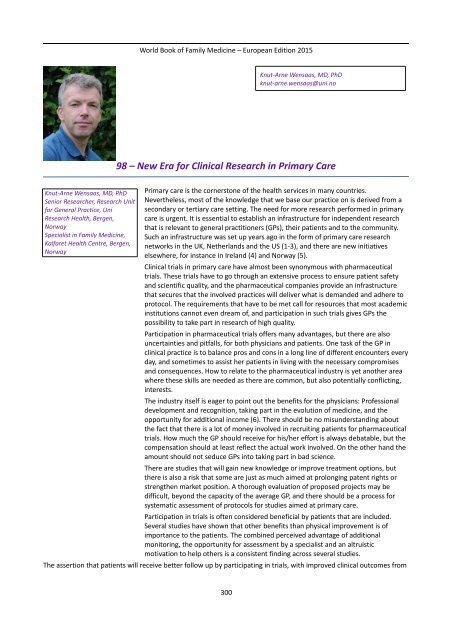Family Medicine
U8UQp
U8UQp
You also want an ePaper? Increase the reach of your titles
YUMPU automatically turns print PDFs into web optimized ePapers that Google loves.
World Book of <strong>Family</strong> <strong>Medicine</strong> – European Edition 2015<br />
Knut-Arne Wensaas, MD, PhD<br />
knut-arne.wensaas@uni.no<br />
98 – New Era for Clinical Research in Primary Care<br />
Knut-Arne Wensaas, MD, PhD<br />
Senior Researcher, Research Unit<br />
for General Practice, Uni<br />
Research Health, Bergen,<br />
Norway<br />
Specialist in <strong>Family</strong> <strong>Medicine</strong>,<br />
Kalfaret Health Centre, Bergen,<br />
Norway<br />
Primary care is the cornerstone of the health services in many countries.<br />
Nevertheless, most of the knowledge that we base our practice on is derived from a<br />
secondary or tertiary care setting. The need for more research performed in primary<br />
care is urgent. It is essential to establish an infrastructure for independent research<br />
that is relevant to general practitioners (GPs), their patients and to the community.<br />
Such an infrastructure was set up years ago in the form of primary care research<br />
networks in the UK, Netherlands and the US (1-3), and there are new initiatives<br />
elsewhere, for instance in Ireland (4) and Norway (5).<br />
Clinical trials in primary care have almost been synonymous with pharmaceutical<br />
trials. These trials have to go through an extensive process to ensure patient safety<br />
and scientific quality, and the pharmaceutical companies provide an infrastructure<br />
that secures that the involved practices will deliver what is demanded and adhere to<br />
protocol. The requirements that have to be met call for resources that most academic<br />
institutions cannot even dream of, and participation in such trials gives GPs the<br />
possibility to take part in research of high quality.<br />
Participation in pharmaceutical trials offers many advantages, but there are also<br />
uncertainties and pitfalls, for both physicians and patients. One task of the GP in<br />
clinical practice is to balance pros and cons in a long line of different encounters every<br />
day, and sometimes to assist her patients in living with the necessary compromises<br />
and consequences. How to relate to the pharmaceutical industry is yet another area<br />
where these skills are needed as there are common, but also potentially conflicting,<br />
interests.<br />
The industry itself is eager to point out the benefits for the physicians: Professional<br />
development and recognition, taking part in the evolution of medicine, and the<br />
opportunity for additional income (6). There should be no misunderstanding about<br />
the fact that there is a lot of money involved in recruiting patients for pharmaceutical<br />
trials. How much the GP should receive for his/her effort is always debatable, but the<br />
compensation should at least reflect the actual work involved. On the other hand the<br />
amount should not seduce GPs into taking part in bad science.<br />
There are studies that will gain new knowledge or improve treatment options, but<br />
there is also a risk that some are just as much aimed at prolonging patent rights or<br />
strengthen market position. A thorough evaluation of proposed projects may be<br />
difficult, beyond the capacity of the average GP, and there should be a process for<br />
systematic assessment of protocols for studies aimed at primary care.<br />
Participation in trials is often considered beneficial by patients that are included.<br />
Several studies have shown that other benefits than physical improvement is of<br />
importance to the patients. The combined perceived advantage of additional<br />
monitoring, the opportunity for assessment by a specialist and an altruistic<br />
motivation to help others is a consistent finding across several studies.<br />
The assertion that patients will receive better follow up by participating in trials, with improved clinical outcomes from<br />
300



